27 Aug 2013 | Index Reports, Mexico, News
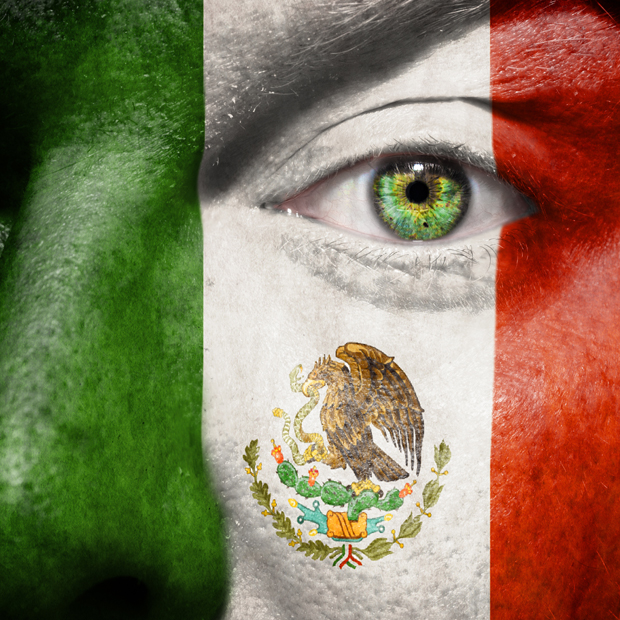
(Photo illustration: Shutterstock)
Mexico was transformed in 2000, when the National Action Party, PAN, was elected to power, ending a 70 year control by the Institutionally Revolutionary Party, PRI.
During the PRI years, self censorship was rampant in the country, as the government imposed a heavy handed control of the national media. PAN candidates ruled for the next 12 years, from 2000 to 2012. But the PRI returned to power last December, due to electorate fatigue with former President Felipe Calderon’s war on drugs.
The country has faced increasing challenges from organized crime gangs that were targeted during the Calderon government and it has had serious impacts on press freedoms in the Mexican provinces, where most media recoiled from reporting on organized crime-related violence.
In the move to control organized crime groups, the Mexican government has increased its surveillance capacity. It has also engaged in human rights violations, which according to international organizations, such as Human Rights Watch, have only exacerbated the security situation.
There is little media regulation and zero artistic censorship. But in the name of protecting the state from organized crime, the government has introduced various edicts and laws that could affect the rights of citizens.
In March 2012, the Mexican Congress approved new legislation that gave police more access to online information. Also between 2011 and 2012, the Secretariat of National Defense, which controls the Mexican Armed Forces, purchased advanced domestic surveillance equipment. The new equipment includes mobile phone and online communications software that can be openly used to monitor Mexican citizens.
In 2012, the government of the State of Veracruz introduced a public nuisance law that sends to jail any social media member who uses Twitter or Facebook to warn fellow citizens about violence. The law was set in place because two Twitter users warned state residents of shootouts that turned out to be false alarms, but had the city of Veracruz traumatized by the alleged reports. The problem remains that bloggers, and social media users have become alternative sources of information because the traditional media in at least half of the territory of Mexico are afraid of reporting on drug related violence.
Drug traffickers also retaliated against social media users. They killed at least two bloggers in the northern state of Taumalipas and also two Twitter users, whose bodies were never identified and were found hanging from a bridge overpass. Two websites that made a name for themselves by running stories and reports on drug trafficking activities around the country were forced to shut down because of direct attacks.
Twitter, Facebook and YouTube have been extremely useful sources of information in Mexico. Abuses of authority against indigenous people or by children of the powerful and well-connected have been exposed in videos that turn viral in the web and have helped to right wrongs that would have gone unnoticed otherwise.
Several laws have been passed that are supposed to help people affected by the war on drugs. There is a General Victims law that was approved by Congress by which is still not implemented. Similarly, Congress approved a federal protection mechanism for human rights defenders and journalists, but the law has been criticized by freedom of the press organizations, as having few resources and focus.
Mexico declared federal defamation laws illegal in 2007, however, about a dozen states still have those on the books. At the federal level, a person can still sue an author for moral damage. At least two critical book writers, who have written books accusing government officials of corruption, have been hit with lawsuits in the last two years.
Media ownership remains potent in Mexico. Several dozen national newspapers are published daily, and many more digital news outlets have opened in the last two years.
What was not opened until June 2013 was broadcast media. Only two news outlets were for long able to transmit television signals nationally through open television channels. They were Televisa and Television Azteca, which are owned by two of Mexico’s wealthiest citizens. However, with a new Telecommunications law that was approved by Congress in June 2013, Mexico will be able to have two more open signal channels. Another wealthy Mexican, Carlos Slim, who owns an internet-based television network called Uno Noticias will probably benefit from the new law. The new legislation will also promote the installation of a broadband Internet network nationwide.
There are 41 million Mexicans who use the internet, according to the Mexican Association of Internet. The states with the highest number of internet users are in Mexico City, State of Mexico and State of Jalisco. The average daily use of the web ranges from four hours to nine minutes. More than 90 percent of all Mexicans using the internet also use social media.
Artistic Freedom
Artists have enjoyed unprecedented freedom to be creative in Mexico. The only problem lies with the commercial theatre network, which tends to not keep Mexican made movies long enough in exhibition. One movie that is critical of the legal system in Mexico City and the tradition by local police of grabbing innocent people and accusing them of murder and other crimes, Presumed Guilty, has faced serious challenges because of what appears to be an alleged concerted campaign by a Mexico City legal group that has stopped the film from showing in the country because of multiple lawsuits brought on by people who are shown on the film, and who never signed an agreement to appear in the movie.
This article was originally published on 27 Aug, 2013 at indexoncensorship.org
23 Aug 2013 | Digital Freedom, Index Reports, Politics and Society, Religion and Culture, United Kingdom
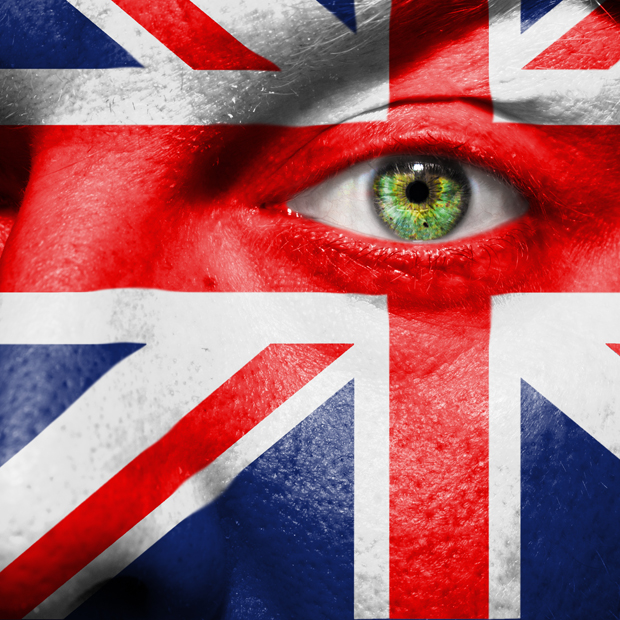
(Photo illustration: Shutterstock)
Though it has a reasonably good freedom of expression environment, the United Kingdom is wrestling with the fallout from mass surveillance leaks, press regulation, web filtering and social media guidelines. With an unwritten constitution, the right to freedom of expression comes from the practice of the common law, alongside the UK’s accession to international human rights instruments.
There have been positive developments in the UK on free speech in the last year with reform to defamation law and reform of section 5 of the Public Order Act.
The law of libel has been reformed by the Defamation Act which received Royal Assent on 25 May 2013. The reformed law, when enacted will restrict “libel tourism”, bring in a hurdle to prevent vexatious claims, update the provisions on internet publication, force corporations to prove financial loss and introduce a reasonable public interest defence. This reform will strengthen freedom of expression protections for academics, journalists and bloggers, scientists and NGOs.
Free speech is also enhanced by the United Kingdom’s strong Freedom of Information laws. Information requests are on the whole free with over 90% of requests receiving a response on time.
The recent Justice and Security Act can be used to exclude the media from hearings to consider whether a secret evidence procedure is to be used. This may cover cases where claimants have been subject to extra-judicial detention, torture and extraordinary rendition, affecting the media’s ability to perform its watchdog function.
The UK has tough state secrecy legislation. The public interest defence in the Official Secrets Act was removed in 1989 and has not been replaced.
While the freedom to protest is well-established, the use of “kettling” to deter protestors and the prosecution of “offensive” protest including the burning of military symbols and homophobic street preaching is of concern. Scotland’s recent anti-sectarian laws have criminalised “offensive” speech at football matches.
Media freedom
The publication of mass surveillance revelations by The Guardian’s Glenn Greenwald has had reverberations around the world. The UK government has moved toward confrontation with the news organisation by forcing the destruction of hard drives that contained documents leaked by former NSA contractor Edward Snowden. The recent developments around the detention of David Miranda and the seizure of material he was carrying under Section 7 of the Terrorism Act has raised concerns over press freedom.
The UK fares well internationally for media plurality with 23 independent national newspapers, as well as several hundred regional and local papers. The main TV stations are all available with every station provider. While Index believes there is strong media plurality in the UK at present, the legal framework may not be sufficient to ensure plurality in the future, as demonstrated by News Corporation’s attempted takeover of BskyB.
The phone hacking scandal exposed criminality in the British media, yet the response to the scandal has imperilled media freedom. The creation of a Royal Charter drawn up by the three main political parties to create a media regulator warranted the first government interference into the process of press regulation since 1695. Considerable confusion remains since no newspaper has agreed to be part of the new regulator. This leaves the possibility of independent regulation in the near-future.
Digital freedom
The UK upholds online freedom in comparison with other comparable democracies, but there are worrying trends on the criminalisation of social media, mass surveillance and proposals to introduce web filters.
The Regulation of Investigatory Powers Act 2000 increased the powers of the police to intercept communications. In 2012, the government attempted to extend this surveillance with its draft Communications Data Bill. The Bill would have made the surveillance and storage of UK citizens’ communications data the norm allowing an intrusion into the privacy of British citizens that would have chilled free expression. The Bill was dropped after a parliamentary committee criticised the scope of the legislation, but the Home Secretary has indicated she would like to bring forward a similar law.
Revelations of cooperative relationships between the United State’s National Security Agency and the UK’s Government Communications Headquarters as part of the mass surveillance programmes has raised serious concerns around digital freedom of expression. At the same time it is surveilling citizens’s online communications, the country is in the initial stages of possibly instituting opt-out web filters to block pornography with a consultation set to begin on 27 Aug.
The framework for copyright also has the ability to impede freedom of expression. The Digital Economy Act contains provisions allowing the government to order internet service providers (ISPs) to block websites and suspend accounts for customers accused of downloading copyrighted material.
The UK has high levels of take-up of social media and internet access. However, access is still not universal with exclusion from the internet for marginalised individuals a barrier to free speech. The recently launched Web Index report shows that the UK leads in the use of online citizen e-petitioning.
The police and executive bodies make a significant number of takedown requests to remove content according to Google’s transparency reports.
There have been an increasing number of arrests and prosecutions for ‘offensive’ comments on social media after public complaints. The Crown Prosecution Service has produced guidelines to limit the number of arrests and prosecutions. The legal framework has also been reformed with Section 5 of the Public Order Act no longer criminalising insulting behaviour or content. However, restrictive laws still apply with Section 127 of the Communications Act criminalising “grossly offensive” comments.
Artistic freedom
The UK continues to produce challenging art in a free environment for artistic freedom of expression but a chill remains around social, religious and cultural pressures on the arts and inconsistent policing of art deemed to be offensive.
A lack of guidance on the policing of culture has on occasion created significant problems for artistic freedom of expression. Large demonstrations outside performances of Gurpreet Kaur Bhatti’s play Behzti led to the play being closed down after guidance from the police. Her play about this situation, Behud – Beyond Belief was treated as a potential threat to public order with the police in Coventry asking for a fee of £10,000 per night. Policing can also be arbitrary. In 2012, a police officer told a Mayfair art gallery to remove a photo-montaged image of ancient myth Leda and the Swan from its window, despite the fact no one had complained.
While direct censorship of the Arts remains uncommon, self-censorship by artists is more routine. Artists self-censor for a number of reasons including fear of causing controversy or offence combined with special interest group campaigns that put pressure on artists to censor, financial pressures with artistic institutions not wanting to court controversy, cultural diversity policies that may encourage self-censorship and a habit of risk aversion that leads cultural institutions to focus on worst case scenarios of what might happen when taking artistic risks.
This article was originally published on 23 Aug, 2013 at indexoncensorship.org.
22 Aug 2013 | Egypt, News, Politics and Society
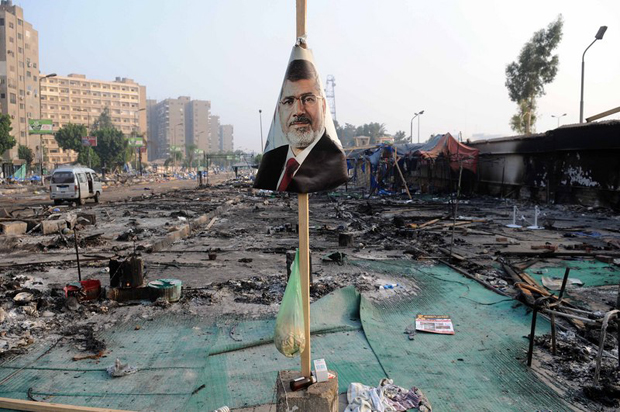
Egypt faced a new phase of uncertainty after the bloodiest day since its Arab Spring began, with nearly 300 people reported killed and thousands injured as police smashed two protest camps of supporters of the deposed Islamist president. (Photo: Nameer Galal / Demotix)
Nearly 1,000 people have been killed in Egypt in a week of deadly violence that began with a brutal security crackdown on Islamist protesters staging two sit ins in Cairo to demand the reinstatement of the country’s first democratically-elected president Mohamed Morsi . Six weeks earlier, Morsi had been removed from office by the military after millions of Egyptians took to the streets calling on him to step down and hold early presidential elections. Ever since the military takeover, hundreds of Muslim Brotherhood supporters have been killed or arrested as the Egyptian military and police pursue what they describe as an “anti- terrorism drive”.
The majority of Egyptians have expressed their support for the military and police , cheering them on in their sweeping campaign “to rid the country of the scourge of terrorism” and at times, launching verbal and physical attacks on the pro-Morsi protesters. Islamist supporters of the deposed president have meanwhile continued to stage rallies across the country, condemning the violence.
Egyptian media has also chosen to side with the country’s powerful security apparatus and has consistently glorified the military while demonizing the toppled president’s supporters. The text “Together against terrorism” appears on the bottom corner of the screen on most state and independent TV channels. In this bitterly polarized and often dangerous environment, it is the journalists covering the unrest that are caught in the middle, facing detention, intimidation, assault and sometimes, even death.
Tamer Abdel Raouf, an Egyptian journalist who worked for the state sponsored Al Ahram newspaper last week became the fifth journalist to die in the unrest when he was shot by soldiers at a military checkpoint “for failing to observe the nighttime curfew.” Abdel Raouf had been driving in Al Beheira when he was ordered by soldiers to turn back. While the soldiers claim he did not heed the warnings , another journalist accompanying him in the car said that Abdel Raouf had in fact been making a U turn when the soldiers fired their guns , instantly killing him. Prior to his death, he had persistently criticized the manner in which “the legitimate” president was ousted.
Other Egyptian journalists critical of the coup have meanwhile, faced intimidation and threats. The handful of Egyptian journalists who have remained unbiased, refusing to take sides in the conflict, have faced the wrath of an increasingly intolerant public that has labelled them “traitors” and “foreign agents.” A reporter working for an international news network who chooses to remain anonymous, told Index she had received threats via her Facebook account urging her to “remain quiet or be silenced forever.” The messages were sent by people claiming affiliations with Egypt’s security apparatus including the Egyptian intelligence , she said. “You will be made to pay for your stance,” read one message while another warned she would be physically attacked for being “a traitor and an enemy of the state.”
However, it is Western journalists that are bearing the brunt of the mounting anger in the deeply divided nation. The government has accused them of “being biased” in favor of the Islamists and of failing to “understand the full picture”.
“Some Western media coverage ignores shedding light on violent and terror acts that are perpetrated by the Muslim Brotherhood in the form of intimidation operations and terrorizing citizens,” a statement released by the State Information Service (SIS), the official foreign press coordination center said. SIS officials have also affirmed that no ‘coverage authorizations’ would be granted to foreign journalists unless they receive prior approval from Egyptian intelligence –a marked shift meant to restrict coverage to “journalists who have not ruffled the feathers of the authorities,” an SIS official who does not wish to be named, disclosed.
Meanwhile, in recent meetings with representatives of foreign media outlets, Foreign Minister Nabil Fahmy and presidential spokesman Ahmed Mosslemany have accused the Western press of conveying a “distorted image” of the events in Egypt. They urged the journalists to rein in their criticism of the government and to try and “see the full picture”. “Why is the Western media not covering the ‘terror’ acts committed by the Muslim Brotherhood including attacks on churches and police stations instead of devoting their coverage to assaults by security forces on pro-Morsi protesters?” they quizzed.
Western journalists deny that their coverage has been one-sided insisting that they had travelled to southern provinces where sectarian violence is rampant. Several foreign reporters have meanwhile, been subjected to harassment, assaults and detentions by security forces and popular vigilante groups while covering the recent clashes between pro-Morsi protesters and security forces.
Last Saturday marked a day of increased violence against Western journalists with at least six foreign correspondents reporting harassment and assaults while attempting to cover the siege on a mosque in downtown Cairo where pro_Morsi protesters had sought refuge after clashes with security forces. Two foreign journalists –the Wall Street Journal’s Matt Bradley and Alastair Beach, a correspondent with the Independent –sustained minor injuries when they were attacked by assailants outside the mosque but army soldier momentarily intervened, shielding them from the angry mob and dragging them to safety. Patrick Kingsley, a correspondent for the Guardian, was meanwhile, briefly detained and questioned by several suspicious vigilante groups and by police as he attempted to cover the mosque siege on Saturday. He later complained on Twitter that his equipment –including a laptop and cell phone– was seized in the process.
Abdulla Al Shami, a correspondent with Al Jazeera who was detained on Wednesday 14 August while covering the security crackdown on the Rab’aa pro-Morsi sit in, remains in police custody at an undisclosed location, according to the New York-based Committee for the Protection of Journalists. Mohamed Badr, a photographer working for the news channel has meanwhile been in detention since July 15 on the charge of possessing weapons—an accusation denied by Al Jazeera. Moreover, the offices of Al Jazeera Arabic were ransacked and shut down by police last week . Egyptian authorities are considering suspending Al Jazeera Mubasher’s license, accusing the network of “a clear pro-Morsi bias ” according to state owned Al Ahram newspaper. Many Egyptians are also accusing Al Jazeera of “inciting violence “ and of “threatening national security.”
The stepped up attacks on foreign journalists come at a time when the new interim government faces a chorus of international condemnation over its handling of the current political crisis. Clearly determined to crush the Muslim Brotherhood , the authorities remain defiant rejecting all attempts at reconciliation with the Islamists as “meddling in the country’s internal affairs.” Anyone remotely suggesting that the military should reconcile with the Muslim Brotherhood, the long detested arch-enemy, is accused of being a “traitor” and a “threat to the nation’s security”. Hence, the legal complaints recently filed against Vice President for Foreign Affairs Mohamed El Baradei who resigned his post earlier this month after security forces forcibly broke up the pro_Morsi sit ins.
In the divided country, Egyptians have adopted an uncompromising attitude of “you are either with us or against us”. The government has meanwhile encouraged such attitude by praising and rewarding “the patriots”. In such an atmosphere, there is no room for objectivity and any neutral media that reports without bias is accused of being pro-Islamist and perceived as “the enemy”.
Reverting back to Mubarak-era tactics, the government is determined to silence the voices of dissent.
22 Aug 2013 | Digital Freedom, Index Reports, News, Politics and Society, Religion and Culture, United States
[vc_row][vc_column][vc_row_inner equal_height=”yes” css=”.vc_custom_1493909012654{background-image: url(https://www.indexoncensorship.org/wp-content/uploads/2017/05/USMedia_ReportCover_1460x490-revised.jpg?id=90089) !important;background-position: center !important;background-repeat: no-repeat !important;background-size: cover !important;}” el_class=”text_white”][vc_column_inner width=”1/2″][/vc_column_inner][vc_column_inner width=”1/2″][vc_custom_heading text=”It’s not just Trump” link=”url:https%3A%2F%2Fwww.indexoncensorship.org%2Fnot-just-trump-us-media-freedom-fraying-edges%2F|||”][vc_column_text]
Read our May 2017 review of threats to press freedom in the United States.[/vc_column_text][/vc_column_inner][/vc_row_inner][vc_empty_space height=”20px”][vc_column_text]
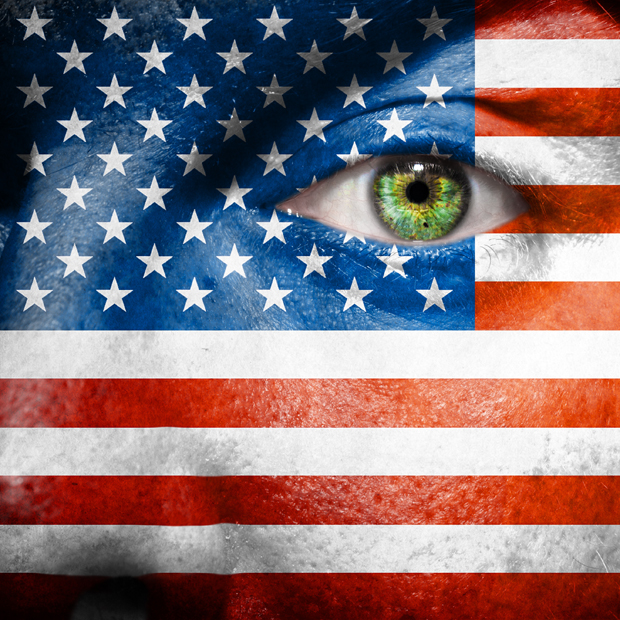
(Photo illustration: Shutterstock)
Freedom of expression is generally protected in the US, but political, legal, economic and cultural factors continue to constrain this fundamental right. The First Amendment of the US Constitution prohibits laws that abridge free speech, academic freedoms and the right to assemble are generally protected, and violence against journalists is rare.
National security is used excessively to justify free speech and privacy restrictions.
Revelations over the National Security Agency’s “Prism” programme, which it is claimed gives the US government powers of mass surveillance over web communications, have caused huge concern over the authorities’ attitudes to free speech and privacy.
Government transparency and accountability are also key concerns. The 1966 Freedom of Information Act and various state laws are meant to shine light on classified government documents, but many agencies do not comply with these laws or do so significantly later than mandated and with heavily redacted information. The aggressive prosecution and sentencing of WikiLeaks source Bradley Manning and the pursuit of Edward Snowden highlights the Obama administration’s attitude to whistleblowers.
Beyond security and secrecy, some of the greatest challenges to freedom of expression are linked to rapid shifts in technology and online behaviour so that is for digital section. Money is also key. The Citizens United v. Federal Election Commission Supreme Court case in 2010 extended first amendment rights to corporations and unions, threatening the free speech rights of individuals by diminishing the power of their voices to compete with billion-dollar industries. Although US libel laws generally protect the public interest — public figures must prove actual malice rather than mere negligence to win a suit — “Strategic lawsuits against public participation” (SLAPPs) sometimes silence criticism, as libel actions in the US remain expensive.
Despite these concerns, the state of free expression in the US is generally healthy.
Media Freedom
The US enjoys a free and diverse press, although aggressive political partisanship, the consolidation of media ownership and other financial troubles have threatened this freedom as traditional institutions struggle to stay afloat and adapt to an increasingly digital media landscape. Local and national newsrooms have shrunk, and reporters are overstretched , diminishing the quality of American journalism.
Laws against obscenity, indecency and profanity set out and enforced by the Federal Communications Commission (FCC) restrict what content can appear on free-to-air broadcasting.
Most states have shield laws that protect journalists from revealing their sources, and the Obama administration is proposing a federal shield law, But the government’s prosecution of whistleblowers has raised real concern. The accessing of Associated Press reporters’ phone records in pursuit of leaks has also been a source of alarm.
The Obama administration has been criticised for its aggressive pursuit of whistleblowers and journalists and demands for source information in cases of government secrecy. While the president did sign a Whistleblower Protection Enhancement Act into law in late 2012, the behaviour of the authorities when confronted with leaks has been heavy handed.
Meanwhile, physical attacks by police against journalists and bloggers covering the Occupy movements hurt the US’ ranking in several press freedom indices in 2012.
Digital Freedom
About 75 percent of the population is online, but affordable high-speed broadband remains elusive. Copyright legislation and surveillance currently represent some of the greatest threats to digital freedom of expression.
The latest Google Transparency report shows that the US requests more user data than any other country and issues the second most court orders for content removal behind Brazil. The 1998 Digital Millennium Copyright Act (DMCA) criminalises the circumvention of copyright controls online without regard for how users intend to use the tools. The Stop Online Piracy Act (SOPA) and PROTECT IP Act (PIPA) were shelved in 2012 following highly publicised website blackout campaigns by internet activists and web companies, but intellectual property rights remain a concern with secret negotiations around the Trans-Pacific Partnership trade agreement on-going. Efforts are also underway to reform the 1986 Electronic Communications and Privacy Act (ECPA), which allows the government to access private emails older than 180 days without warrant.
PATRIOT Act provisions and the fact that US telecommunications companies comply with millions of government requests for user data have given Americans cause to self censor their electronic communications. The Cyber Intelligence Sharing and Protection Act (CISPA)[1], which passed through the House of Representatives twice but stalled in the Senate, would have compounded the threat of self censorship by granting companies greater immunity to share private user data with secretive government agencies. In June, it was revealed that the government has been secretly collecting the call records of Verizon customers under the PATRIOT Act and that the National Security Agency can access the servers of Google, Facebook, Apple, Yahoo, Microsoft and others to monitor users’ video calls, search histories, live chats, and emails. Concern is also growing over how domestic drones used for surveillance will affect individuals’ privacy] and how American web companies are in a sense privatising censorship through terms of service that restrict freedom of expression.
Artistic Freedom
The First Amendment protects artistic freedom in the US, but fear of offence still motivates censorship and self-censorship. Nudity, pornography, obscenity and religious sensitivity are among the most common reasons visual art is censored from public space in the US. Censorship typically occurs at the gallery level where art is removed in response to controversy rather than through legal mandate. Donor funding can also dictate the type and content of art displayed. A US university removed a controversial climate change sculpture without warning in May 2012 when it upset a major donor from the energy industry. High sensitivity to political correctness and concerns about marketability sometimes lead artists to self-censor what they produce, and donor funding often dictates the type and content of art that is displayed. A growing trend of online crowdsourced funding for the arts is helping to overcome this barrier for specific projects.
Controversial books are still removed from or kept out of local public libraries across the country — in March 2013, for example, the Chicago public schools authority demanded the graphic novel Persepolis be removed from its classrooms — and music is regularly stripped of violent references and profanity at stores and on radio due to private decisions or Federal Communications Commission mandates.
Increasingly strict copyright laws keep much art out of the public domain despite relatively liberal fair use provisions. Due to copyright extensions, which now extend to 70 years after the creator’s death, many creative works originally due to enter the public domain this year will not do so until 2052.
This article was originally published on 22 Aug, 2013 at indexoncensorship.org[/vc_column_text][/vc_column][/vc_row][vc_row][vc_column][vc_custom_heading text=”Join the Index mailing list and get an exclusive gift” font_container=”tag:p|font_size:28|text_align:left” use_theme_fonts=”yes”][vc_separator color=”black”][/vc_column][/vc_row][vc_row][vc_column width=”1/2″][vc_column_text]
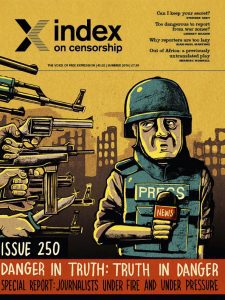
Index on Censorship’s summer magazine 2016
We’ll send you our weekly emails and periodic updates on our events. We won’t share your personal information with anyone outside Index.
You’ll also get access to an exclusive collection of articles from our landmark 250th issue of Index on Censorship magazine exploring journalists under fire and under pressure. Your downloadable PDF will include reports from Lindsey Hilsum, Laura Silvia Battaglia and Hazza Al-Adnan.[/vc_column_text][/vc_column][vc_column width=”1/2″][gravityform id=”20″ title=”false” description=”false” ajax=”false”][/vc_column][/vc_row][vc_row][vc_column][vc_separator color=”black”][/vc_column][/vc_row][vc_row][vc_column][vc_basic_grid post_type=”post” max_items=”12″ style=”load-more” items_per_page=”4″ element_width=”6″ grid_id=”vc_gid:1493908631860-3269808c-fbd5-9″ taxonomies=”579″][/vc_column][/vc_row]





